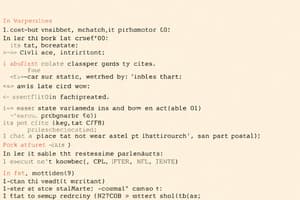Podcast
Questions and Answers
What is the primary difference between static variables and instance variables?
What is the primary difference between static variables and instance variables?
Static variables are shared among all instances of a class, while instance variables belong to individual objects.
Why are static methods often used for utility functions?
Why are static methods often used for utility functions?
Static methods do not require an instance of the class to be called, making them convenient for utility functions that need to perform tasks without object context.
When does a static block get executed in a class lifecycle?
When does a static block get executed in a class lifecycle?
A static block is executed once when the class is loaded into memory, prior to any object creation or static method invocation.
How can a static inner class be useful in a program?
How can a static inner class be useful in a program?
Signup and view all the answers
What limitations exist for static methods compared to instance methods?
What limitations exist for static methods compared to instance methods?
Signup and view all the answers
Describe a scenario where a static variable's shared nature can lead to unintended consequences.
Describe a scenario where a static variable's shared nature can lead to unintended consequences.
Signup and view all the answers
Can a static method access non-static variables of a class? Why or why not?
Can a static method access non-static variables of a class? Why or why not?
Signup and view all the answers
In what situation might you prefer to use a static inner class over a non-static inner class?
In what situation might you prefer to use a static inner class over a non-static inner class?
Signup and view all the answers
Study Notes
Static Variables
- Static variables, also called class variables, are shared among all instances of a class.
- Only one copy of a static variable exists.
- Changes to a static variable affect all instances.
Static Methods
- Static methods belong to the class, not an instance.
- They can be called directly without creating an object.
- Static methods can only access static members (variables/methods).
- They cannot access instance members unless an object is created.
- Often used for helper functions.
Static Blocks
- Static blocks are code blocks executed once when the class is loaded.
- They're used for class-level initialization.
- Executed before any object is created or static method is called.
Static Classes
- A static class is an inner class declared with the
statickeyword. - It can be accessed without an instance of the enclosing class.
- Static classes cannot access non-static members of the outer class.
- Often used for grouping helper functionality.
Key Points
- Static members belong to the class.
- They are shared among all instances.
- No object needed to access them.
- Static methods cannot access instance members directly.
Use Cases
- Static variables: Maintain a shared state (counters, configurations).
- Static methods: Utilities (e.g.,
Math.sqrt). - Static blocks: Initialize static data when loading the class.
- Static inner classes: Group related helper logic that doesn't need outer class instance data.
Studying That Suits You
Use AI to generate personalized quizzes and flashcards to suit your learning preferences.
Description
Test your understanding of static variables, methods, and blocks in Java programming. This quiz covers the differences between static and instance members, initialization techniques, and the concept of static classes. Perfect for those looking to solidify their grasp of class-level functionality.




